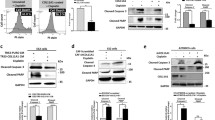Abstract
Cysteine-rich 61 (CYR61), a member of the connective tissue factor CCN (Cyr61, CTGF, Nov) family, facilitates angiogenesis by interacting with integrins. Recent observations have indicated that CYR61 also rescues cells from anti-cancer drug-mediated apoptosis but the detailed mechanism underlying the role of CYR61 during apoptosis has not been identified. To better understand the role of CYR61 during cisplatin-induced apoptosis in tumor cells, we overexpressed or inhibited CYR61 expression in human cervical cancer cells (HeLa cells) and measured cisplatin-mediated apoptosis. The results from these experiments clearly demonstrate that CYR61 prevents cisplatin-induced apoptosis by inhibiting caspase-3 activity in HeLa cells. Therefore, CYR61 may be a useful therapeutic target for cisplatin-resistant tumors.



Similar content being viewed by others
References
Babic AM, Kireeva ML, Kolesnikova TV, Lau LF (1998) CYR61, a product of a growth factor-inducible immediate early gene, promotes angiogenesis and tumor growth. Proc Natl Acad Sci USA 95:6355–6360
Blanc C, Deveraux QL, Krajewski S, Jänicke RU, Porter AG, Reed JC, Jaggi R, Marti A (2000) Caspase-3 is essential for procaspase-9 processing and cisplatin-induced apoptosis of MCF-7 breast cancer cells. Cancer Res 60:4386–4390
Chen Y, Du XY (2007) Functional properties and intracellular signaling of CCN1/Cyr61. J Cell Biochem 100:1337–1345
Chomczynski P, Sacchi N (1987) Single-step method of RNA isolation by acid guanidinium thiocyanate-phenol-chloroform extraction. Anal Biochem 162:156–159
Kireeva ML, Mo FE, Yang GP, Lau LF (1996) Cyr61, a product of a growth factor- inducible immediate-early gene, promotes cell proliferation, migration, and adhesion. Mol Cell Biol 16:1326–1334
Leu SJ, Lam SC, Lau LF (2002) Pro-angiogenic activities of CYR61 (CCN1) mediated through integrins alphavbeta3 and alpha6beta1 in human umbilical vein endothelial cells. J Biol Chem 277:46248–46255
Menéndez JA, Mehmi I, Griggs DW, Lupu R (2003) The angiogenic factor CYR61 in breast cancer: molecular pathology and therapeutic perspectives. Endocr Relat Cancer 10:141–152
Mo FE, Muntean AG, Chen CC, Stolz DB, Watkins SC, Lau LF (2002) CYR61 (CCN1) is essential for placental development and vascular integrity. Mol Cell Biol 22:8709–8720
Sampath D, Winneker RC, Zhang Z (2001) Cyr61, a member of the CCN family, is required for MCF-7 cell proliferation: regulation by 17 beta-estradiol and overexpression in human breast cancer. Endocrinology 142:2540–2548
Tsai MS, Hornby AE, Lakins J, Lupu R (2000) Expression and function of CYR61, an angiogenic factor, in breast cancer cell lines and tumor biopsies. Cancer Res 60:5603–5607
Tsai MS, Bogart DF, Mehmi I, Lupu R (2002) Expression and regulation of Cyr61 in human breast cancer cell lines. Oncogene 21:964–973
Wesierska-Gadek J, Schloffer D, Kotala V, Horky M (2002) Escape of p53 protein from E6-mediated degradation in HeLa cells after cisplatin therapy. Int J Cancer 101:128–136
Xie D, Miller CW, O’kelly J, Nakachi K, Sakashita A, Said JW, Gornbein J, Koeffler HP (2001) Breast cancer. Cyr61 is overexpressed, estrogen-inducible, and associated with more advanced disease. J Biol Chem 276:14187–14194
Acknowledgments
This work was supported by a grant from the Korea Health 21 R & D Project, Ministry of Health & Welfare, Republic of Korea (Project Number: A040004) and by a grant from the National Cancer Center, Korea (NCC-0810410-1).
Author information
Authors and Affiliations
Corresponding author
Additional information
An erratum to this article can be found at http://dx.doi.org/10.1007/s10529-008-9876-1
Rights and permissions
About this article
Cite this article
Rho, S.B., Byun, HJ., Park, SY. et al. Cysteine-rich 61 (CYR61) inhibits cisplatin-induced apoptosis in ovarian carcinoma cells. Biotechnol Lett 31, 23–28 (2009). https://doi.org/10.1007/s10529-008-9845-8
Received:
Revised:
Accepted:
Published:
Issue Date:
DOI: https://doi.org/10.1007/s10529-008-9845-8




